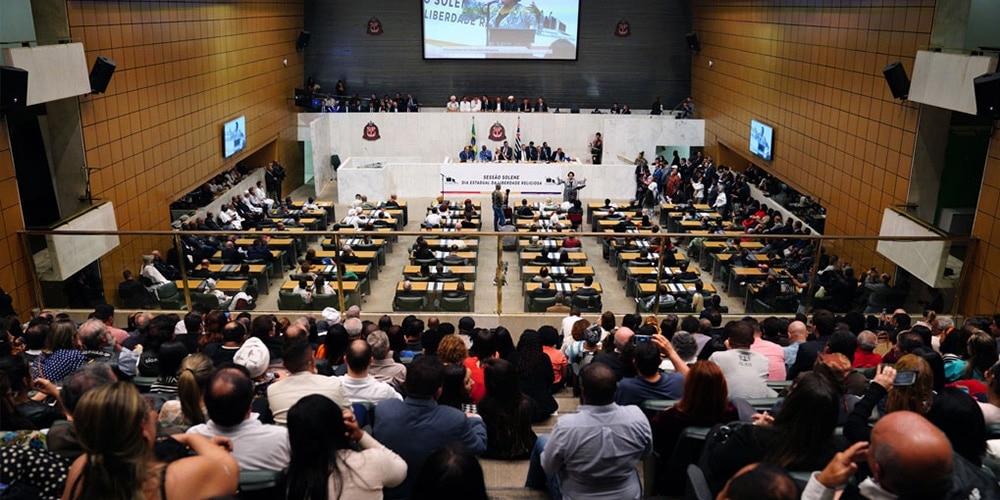
A packed agenda of events and high-level visits marked Religious Freedom Week in the Brazilian city of São Paulo, May 24-27, 2019. Celebrations were coordinated by Adventist member and State Representative Damaris Moura, an attorney and long-time religious freedom advocate in the country. She helped organize the week of events in partnership with the Brazilian Association of Religious Freedom and Citizenship (ABLIRC).
A special guest for the celebrations was Adventist Church Public Affairs and Religious Liberty director Ganoune Diop, who also serves as secretary general of the International Religious Liberty Association (IRLA).
Events held around the city brought together religious leaders, civil authorities, government officials, political representatives, and human rights associations. The purpose of the celebrations, according to organizers, was to “promote wide public respect for different beliefs in the face of the many tragedies and massacres that have occurred in the name of religion.” Several symposia focused on the foundational role played by religious freedom in society and the challenges of religious intolerance.
Religious Liberty in Brazil
By law, the practice of discrimination or prejudice against religions has been a crime in Brazil since 1995. Statistics from the Ministry of Human Rights show, however, that nationwide, an incidence of religious intolerance occurs every 15 hours. Adherents of religions of African origin are among the main targets. The State of São Paulo has the highest percentage of occurrences, leaders said.
This reality prompted Moura, founder of the Religious Freedom Commission at the Brazilian Attorney’s Order, to propose the creation of Religious Freedom Week.
Throughout the week, a delegation of religious freedom leaders, led by Diop and Moura, took part in a series of visits with civic leaders. According to Moura, the week of events was “a breakthrough in the fight to promote religious liberty and to raise public awareness and interest in this subject.”
Some 7,000 people took part in Religious Freedom Week, both at regional events, in Adventist churches, and a major symposium held at the Adventist University Center of São Paulo (UNASP).
Official Visits
Just as important as these public events, Moura said, were several visits that called the attention of civic leaders to the realities of religious intolerance and encouraged them to create solutions and programs to combat these challenges.
“It is not enough to just organize forums, meetings, events, or even to pass new laws,” Moura said. “We have to reach out to the top administrators of the city and state so that laws become effective programs that educate and guide all people.”
Only in this way, Moura explained, can we leave for our descendants a more humanized society that respects the rights of all.
It was a theme echoed in Diop’s presentations throughout the week.
“When we celebrate religious liberty, we are indeed celebrating humanity itself, and the right of belief that every human being possesses by nature of his or her own free will,” Diop said. “There is a common belief in most religious cultures that the freedom to express oneself according to one’s own beliefs and traditions is an inviolable human right.”
Globo TV, Brazil’s largest television network, interviewed Diop about Religious Freedom Week.
Other events during Religious Freedom Week included the 161st Forum of Religious Liberty and Citizenship, held in the city of Mogi das Cruzes, where Diop spoke to some 200 civil and religious leaders.
On May 25, more than 1,500 people attended the Congress of Religious Liberty and Citizenship at the Adventist University Center of São Paulo (UNASP). The following day, a training session was held for leaders of the Regional Forum of Religious Liberty of the Adventist Church’s Central Brazil Union Conference.
In later visits to authorities, Moura suggested the creation of a special office to monitor occurrences of religious intolerance in the city of São Paulo, which, with 11.5 million inhabitants, is among the most populous cities in the world.
The week of celebrations ended May 28 with visits to federal civic leaders in Brasilia, including congress representatives, judges, and ministers, leaders said.